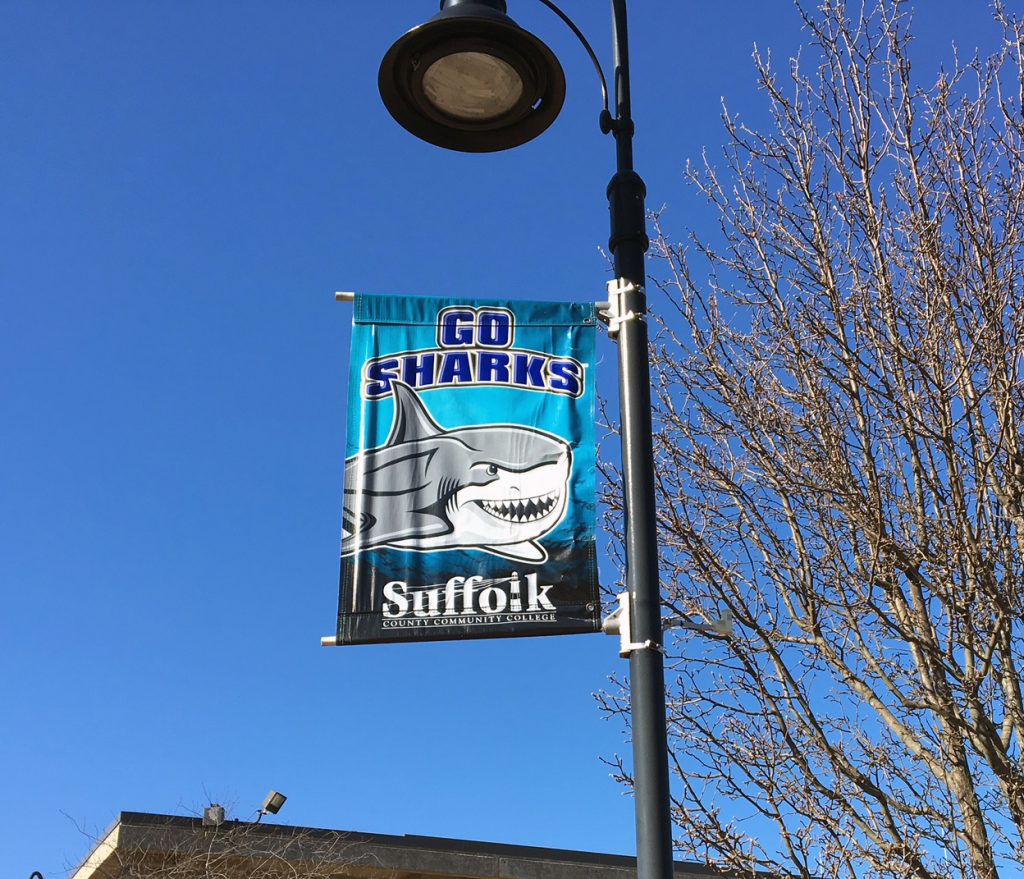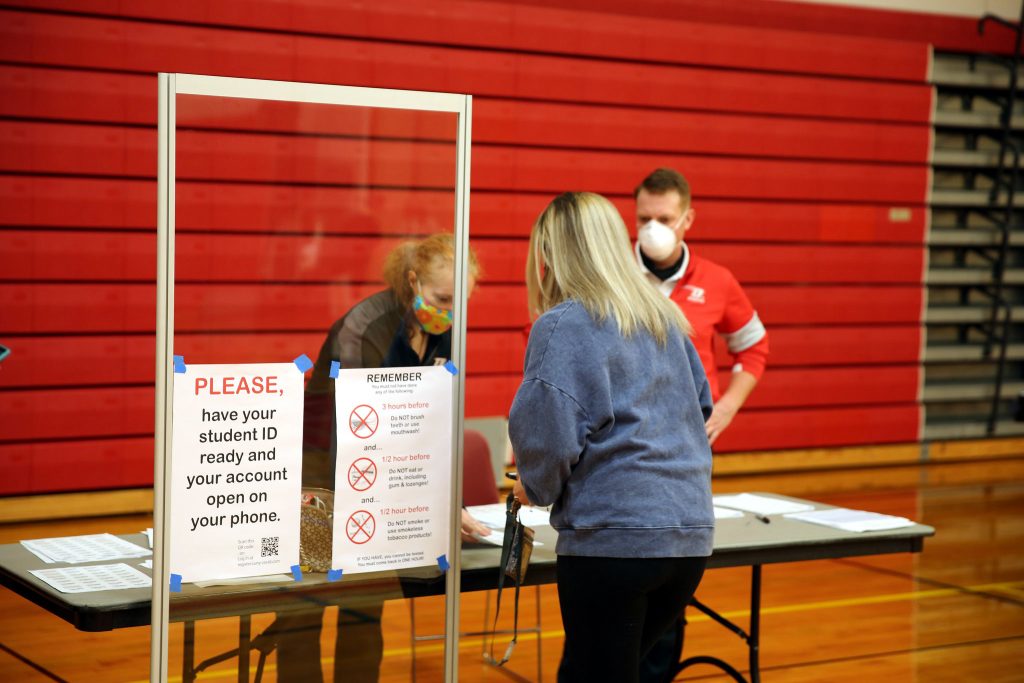CUNY Chancellor Félix V. Matos Rodríguez visited The CUNY Graduate Center (GC) on Thursday, joining CUNY Graduate Center President Robin L. Garrell to spotlight the range of interdisciplinary research at CUNY’s premier graduate education institution and to meet with distinguished professor Dennis Parnell Sullivan (center in photo above) — this week named the recipient of the 2022 Abel Prize for Mathematics, known as the Nobel Prize of Math, granting a monetary award of nearly $860,000.
“The collaboration among students, faculty and staff at the CUNY GC leads to advancements across disciplines in the sciences, social sciences and the humanities holds great benefit for New York City and beyond,” said Chancellor Matos Rodríguez. “Seeing our researchers back on campus, in their laboratories and continuing to thrive at CUNY, is yet another fitting representation of the great distance our University has traveled since the onset of the pandemic two years ago.”
The Chancellor and President Garrell met with Sullivan, who will be presented with the award in Oslo, Norway, on May 24. Sullivan, the Albert Einstein Chair in Science (Mathematics), has served on the GC faculty for more than four decades and also serves as a distinguished professor of mathematics at Stony Brook University.
“The Abel Prize is a global acknowledgement for exceptionally accomplished mathematicians, something that professor Sullivan has proven himself to be time and again throughout his extraordinary career,” the Chancellor said. “His excitement and devotion to the field of mathematics are matched by his commitment to teaching and mentoring students at a public university recognized as a national leader of social mobility. We congratulate him on this remarkable and historic achievement.”
Sullivan earned the prize for his groundbreaking contributions to topology, the study of properties of spaces. During the visit, he spoke about the history of the GC’s mathematics department, which dates to the tenure of his former colleague, the late Mina Rees, the GC’s founding dean of graduate studies and later its first president, a pioneering mathematician herself and the first woman to serve as president of the American Association for the Advancement of Science.

“I was delighted to host Chancellor Matos Rodríguez during his visit to the Graduate Center, giving him an opportunity to engage with faculty and students in cognitive neuroscience and digital humanities and to learn about their research and innovations,” said Graduate Center President Garrell. “We also met with and congratulated Distinguished Professor Dennis Sullivan, who has just been awarded the 2022 Abel Prize in mathematics.”
The GC was recently recognized as a leader in gender equality among higher education institutions in a report authored by the Eos Foundation and the American Association of University Women. The report lists the school as the second-ranking university in the United States with respect to gender equality among universities designated as R1 with for its significant number of women senior leaders and faculty. The GC was also ranked number one in the country for the most women appointed as full professors.
Sullivan is the second GC professor to receive an outstanding recognition this month. Kristina Richardson, an associate professor at the Graduate Center and Queens College, won the Dan David Prize, a $300,000 award from Tel Aviv University that is the world’s largest history prize and has been likened to a MacArthur “Genius” Grant for historians. Richardson’s investigation of Arabic manuscripts highlights the importance of understanding the lives of non-elites and marginalized groups when seeking to gain a complete view of a society as a whole. Her latest book focused on the Roma in the Medieval Islamic world.
State-of-the-Art Facilities
The Graduate Center is a New York City powerhouse and a destination for scholars from around the country and world. The Center and CUNY colleges offer doctoral and master’s degree programs and award nearly 10,000 graduate degrees each year.
The Chancellor’s visit included a stop at the laboratory of professor Tony Ro, director of the GC’s cognitive neuroscience program. In the neuroscience lab, Ro and his student-researchers demonstrated human brain imaging, stimulation and recording methods. The lab’s research seeks to develop a better understanding of the cognitive and neural mechanisms that underlie human perception and attention.
Chancellor Matos Rodríguez and President Garrell later visited the GC’s Digital Scholarship Lab to meet with leadership from Graduate Center Digital Initiatives (GCDI), a collaborative enterprise by which centers, labs, initiatives and programs across a range of disciplines work with scholars and technologists to integrate digital tools into their research and teaching. Matthew K. Gold and Lisa Rhody, the GCDI director and deputy director, respectively, spoke about the reach of this work, which includes the development of the University’s academic social network, CUNY Academic Commons.
Joining the leaders in the lab were students who currently or previously served as digital fellows with GCDI, who spoke with the Chancellor about their projects. Rafael Davis Portela, a doctoral candidate in the history program who served as a fellow for three years, credits GCDI as the reason he chose his research topic: the attempt by the military dictatorship that ruled Brazil during the 1970s through the early 1980s to develop a national computing industry. Portela now serves as student adviser to the data analytics and visualization program.
“The Graduate Center Digital Initiatives reignited my passion for computers and technology, where I was able to work and develop computing skills while helping the GC community,” said Portela. “I realized that I like to teach computing research tools to researchers who don’t come from a STEM background or are completely new to programming, allowing them to use the most advanced research tools of their field. Undoubtedly, GCDI changed my career.”
The GC is debuting a new Astrophysics master’s program designed to prepare students in astronomy and physics doctoral programs and diversify the STEM fields. Thanks to a $4 million grant from the Simons Foundation, students will be able to attend the master’s program tuition-free.
The CUNY Graduate Center is a leader in public graduate education devoted to enhancing the public good through pioneering research, serious learning, and reasoned debate. The Graduate Center offers ambitious students nearly 50 doctoral and master’s programs of the highest caliber, taught by top faculty from throughout CUNY — the nation’s largest urban public university. Through its nearly 40 centers, institutes, initiatives, and the Advanced Science Research Center, the Graduate Center influences public policy and discourse and shapes innovation. The Graduate Center’s extensive public programs make it a home for culture and conversation.





Facebook Comments